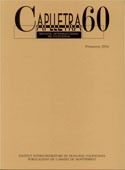J. V. Foix and Romantic irony
DOI:
https://doi.org/10.7203/caplletra.60.7938Keywords:
irony, Romantic irony, German Romanticism, Schlegel, Foix, Avant-gardism Abstract
Abstract
Abstract: This paper is based on the assumption that the general conception of irony cannot be applied to the works by J. V. Foix. Instead, they should be considered in the context of Romantic irony as conceived by Friedrich Schlegel, documented in Ingrid Strohschneider-Kohrs’ research. After defining the term “reflection” as the self-nihilation of the absolute, this paper analyses some of the poet’s prose poems, in which this kind of irony can be identified. In Foix’s writings, frequent meta-reflections on poetry or painting make texts or paintings appear illegible or endowed with great subversive power. A piece like “El Roc pertús” deconstructs the absolute exemplarity and orchestrates a play of ironic refraction, the final consequence of which is an anti-theological turn.
Key words: irony, Romantic irony, German Romanticism, Schlegel, Foix, Avant-gardism.
 Downloads
Downloads
Downloads
Published
How to Cite
-
Abstract365
-
PDF (Català)249
Issue
Section
License
Authors submitting work to Caplletra for publication must be the legitimate holder of the usage rights. Legitimacy for the purposes of publishing the work must also include images, tables, diagrams and any other materials that may complement the text, whether they are the author of such material or not.
Copyright: on publishing their work in the journal, the author grants Caplletra. Revista Internacional de Filologia usage rights (reproduction, distribution and public communication) for both the paper printed version and for the electronic version.
All work published in Caplletra is covered by the Creative Commons license type Attribution-NonCommercial-NoDerivatives 4.0 (CC BY-NC-ND 4.0).
RESPONSABILITY
Caplletra. Revista Internacional de Filologia does not necessarily identify with the points of view expressed in the papers it publishes.
Caplletra. Revista Internacional de Filologia accepts no responsibility whatsoever for any eventual infringement of intellectual property rights on the part of authors.






